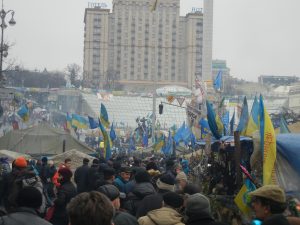Students who were in Ukraine a few weeks before riots broke out are keeping up with the developments as violence escalates.

Citizens riot in Indepence Square in Kiev, Ukraine. Students traveled to Ukraine over winter break. (Photo contributed by Brantly Houston)
Ukraine protests arose in late November. Riots in Kiev have since formed, with protestors fighting to become part of the European Union.
According to CNN, demonstrations began as a peaceful method of opposing Ukrainian President Viktor Yanikovych’s rejection to signing the EU charter. Instead, he chose to form closer relations with Russia. However, since declaring independence from the Soviet republic in 1991, the people of Ukraine have attempted to recover from decades of soviet rule. This has resulted in a general distaste for Russia.
As of Tuesday, NBC reported six people have been killed, with hundreds more injured in the intensified clashes with police forces.
Brantly Houston, junior ad/PR major from Abilene, was in Ukraine just weeks before the riots broke out. He and his classmates were able to see the demonstrations before they became tainted with violence.
“It felt like you were walking through history,” Houston said. “I think some of us were kind of nervous and didn’t know what to expect, but it was totally calm and tame at the time. But I can see how it could very easily turn violent.”
Houston said the demonstrations set up in Kiev’s Independence Square were a mix between the “Les Mis” barricades and Hoovervilles. Inside, many protestors camped out, with someone either giving a speech or singing Ukrainian songs on a make-shift stage without ceasing.
Savannah Pybus, freshman art education major form North Richland Hills, was also on the trip.
“They’re really fighting for it because they’re trying to be as anti-Russian as possible,” she said. “They want to be their own country; they just want to be Ukraine.”
Pybus and Houston accompanied the Hillcrest Church of Christ university group on a mission trip to Kolenski, Ukraine from Dec. 27 – Jan. 4. They and about 14 other students volunteered with Jeremiah’s Hope, a non-profit organization that works with at-risk children in Ukraine, to host camps for the children of Kolenski.
Pybus said many children of the area are from troubled households, with their parents regularly becoming intoxicated to fight off the region’s frigid weather.
“It’s hard to express how truly awful it is for them, because they don’t necessarily know that the life they have is sad, which is sad in and of itself,” Pybus said.
She said the riots are mostly contained in the Kiev area and aren’t affecting the villages of Kolenski or Jeremiah’s Hope, yet.
“That’s what they’re really worried about; they’re worried about them spreading. And if it does spread, the children and those families that are so poor won’t have any means to protect themselves,” Pybus said. “That’s a scary thought, thinking of those kids not having the ability to protect themselves from that.”
Most recently, Ukrainian protestors took to occupying government buildings as a demonstration technique, with many arrests ensuing their actions. On Wednesday, Ukraine’s parliament passed an amnesty law, claiming to release demonstrators from prison only after others vacate the government buildings.
The riots continue to rage on, with Ukrainian citizen’s desire for independence from Russia fueling the flames. CNN said Ukraine’s decision can be seen as a turning point between the West – the EU and the United States – and Russia. If Ukraine were to join the EU, the West’s reach would infiltrate further into the east, but at the same time, Russia would view it as losing traditional territory.
Pybus said she wished students would become more educated on world conflicts, such as Ukraine’s.
“I would encourage people to be more informed about Ukraine, because Justin Beiber is on the headlines about getting arrested instead of more than four people dying in Kiev,” Pybus said. “That’s really sad to me, that’s just awful.”
Houston said students should not only be aware of the conflicts, but be an advocate for resolve in any way possible.
“I would encourage ACU students to pray for a country. I’m praying for Ukraine now, but just pick one,” Houston said, “because there are going to be situations all around the world that we just have no idea about. It’s a good practice to just be in prayer and intercede for people halfway around the world. Because I got to go, I can see, concretely, where the needs are.”
